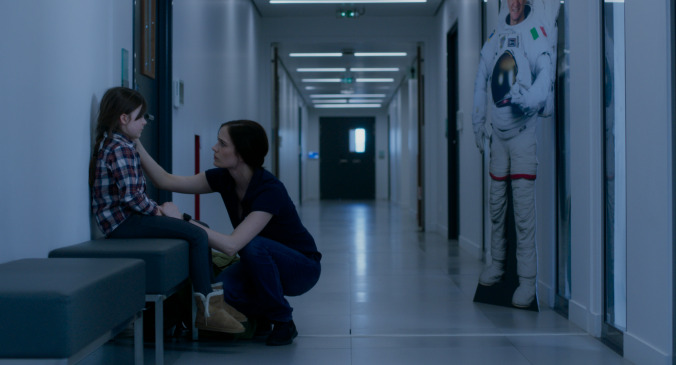Astronaut movies centered on male protagonists with heavy emotional baggage are practically a genre unto themselves (see: Ad Astra and First Man). Traumas and mental hangups unfold as these tight-lipped heroes prepare to navigate the unimaginable perils of space travel, plunging us into dark corners of the mind as mysterious as the universe itself. Proxima, the latest by French writer-director Alice Winocour, attempts to draw such a portrait with a female subject, taking into account the enormous gender disparity endemic to real-life space agencies (nearly 90% of people who have traveled into space have been men).
On the one hand, Winocour takes a refreshingly grounded approach to the astronaut experience by focusing on the intensive training process in the weeks before takeoff, a period that sees our heroine—a first-time astronaut—struggling to prove herself to sexist naysayers while coming to terms with her imminent, year-long separation from her young daughter. Yet in striving to carve out a distinctly feminine experience within the male-dominated profession, the filmmaker loses sight of the person inside the space suit, falling back on the family/career dilemma in a way that feels archaic and, for the most part, less than insightful.
Proxima starts off promisingly enough, as Sarah (Eva Green) learns that she’s been selected to join an international crew on an upcoming mission to Mars. She can barely contain her excitement when she tells her ex-husband (Lars Eidinger) the good news, though this also means he’ll be taking full responsibility for their daughter while Sarah’s away. Sarah and Stella (Zélie Boulant-Lemesle), a chatty 8-year-old with learning disabilities, are deeply attached, so it comes as a shock when the family psychologist, Wendy (Sandra Hüller), brings up the possibility that Sarah might never return from her interstellar travels. The prospect weighs on Sarah as she commences training, entering a spiritual holding cell between life with Stella and life in space. To paraphrase one character’s clichéd words of wisdom, there’s no such thing as a perfect mother, just like there’s no such thing as a perfect astronaut. This sentiment is at the very heart of Proxima, and renders the drama frustratingly glib.
Shot on location in various real facilities of the European Space Agency, the film highlights the physically arduous and surreal nature of space prep. Sarah’s training sessions, consisting of underwater drills and endurance tests on wiry, mechanical contraptions, are captured by cinematographer Georges Lechaptois with a quality somewhere between steely formality and ethereal wonder. Meanwhile, gender discrimination rears its ugly head in the form of Mike (Matt Dillon), the mission’s captain and a stereotypical American douchebag who welcomes Sarah by noting how pleased he is that the crew will have a French woman “up there” to cook for them.
Distressing long-distance calls from Stella throw Sarah off her game, and a botched mother-daughter reunion seems to confirm Mike’s biases—turns out it’s difficult to be an attentive mother when you’re busy training to go to Mars, a fact that Winocour finds interesting enough to base an entire character on. Sarah’s complete lack of foresight and straightforward inner conflict betrays Winocour and co-writer Jean-Stéphane Bron’s unimaginative script, which is narrowly concerned with manufacturing drama that demonstrates the incompatibility between “mother” and “astronaut.” What’s more, the institutional sexism experienced by female astronauts is shorn of complexity and whittled down to a single bad guy—who turns out to be a softie, anyway.
With her last feature, Mustang, Winocour showed a knack for building righteous anger and busting the patriarchy through emotionally stirring, if heavy-handed, means. By contrast Proxima’s feminist backbone feels flimsy, as if putting Sarah’s womanhood and motherhood on display against a masculine backdrop automatically amounts to feminist storytelling. In one scene Sarah explains how she’s dreamed of going to space ever since she was a little girl in France, playing pretend with a lamp shade over her head. She grins when a female colleague compares her to Valentina Tereshkova, the first woman sent to space; her face glows when she sees her photo on magnets at the convenience store. But where, exactly, does this desire to see the stars come from? Why is this her dream, and what lies beyond her achievements and her domestic balancing act?
That’s not to say this plodding interpretation of the female astronaut experience is without its bright spots: Midway through the film, Winocour cuts to a dreamy sequence of an astronaut moving slowly, weightlessly through space as Stella sobbingly relates her troubles at school in voice-over. The moment shows how even the most trifling problems—a weeping child complaining about math—can pack a powerful emotional punch, capable of coexisting with the most epic, primordial images. Plus, Eva Green delivers a fine performance as a woman fighting to maintain her strength, positivity, and composure. Her slightly wounded, saucer-eyed gaze hints at a rich, emotionally tumultuous inner world, yet Winocour does little to unleash this potential. Somewhere behind the scaffolding of contrived feminist nods is a fully fleshed out protagonist, but ultimately Proxima only confirms and delivers what we already know.










































